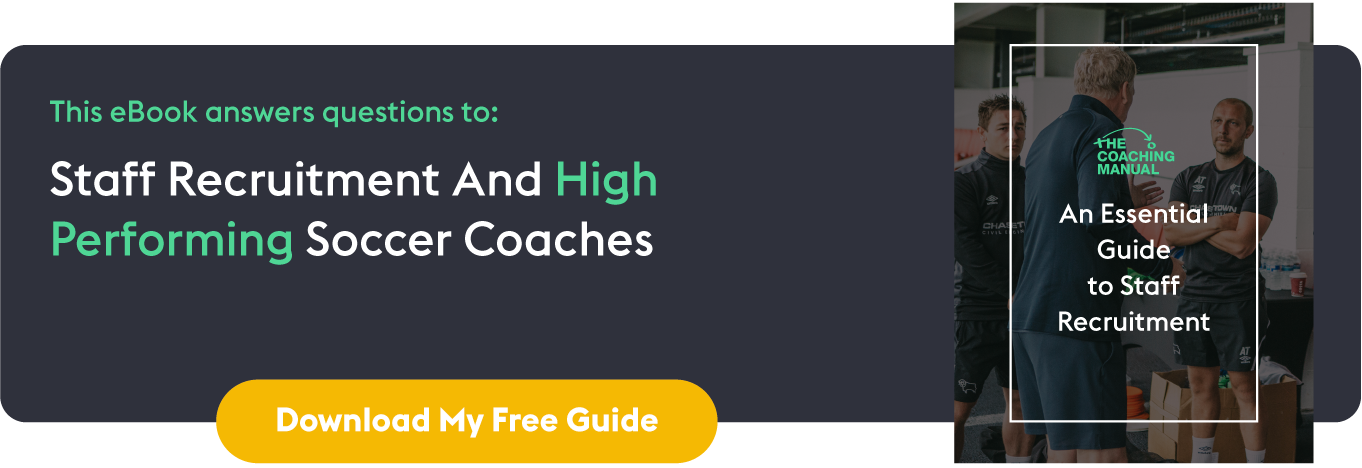You've taken the time to recruit quality coaches, build your club culture, and implement your playing philosophy. Your efforts are starting to show on the pitch, with season-on-season improvements in results, and a strengthening player progression pathway. Everything is as close to perfection as it can be for a Director of Coaching (DOC).
But then one of your most valuable coaches hands in their notice; they've been offered a more senior position - with more responsibility and better remuneration - at another club or organisation. There's nothing you can do to dissuade them. Once you've overcome your initial disappointment, what do you do? And should you be worried about it?
What causes coaching turnover?
An annual turnover rate of 10% is generally cited by business experts as a "good" - or at least sustainable - level to aim for. In other words, for every 10 coaches within your club, on average one should leave every year.
However, sporting organisations often see much higher rates. Taking American football as an example, analysis from USA Today revealed that 114 of the 601 Southern Californian high schools changed Head Coach ahead of the 2016 season - equating to a turnover rate of 19%. Over the same period, an estimated 129 of 560 Florida high schools saw their Head Coach depart (a turnover rate of 23%). Rising to collegiate level, 24 of the 128 Football Subdivision Series schools changed Head Coach from 2015-16 (a 19% turnover rate), while in NFL more than a fifth (22%) of franchises saw Head Coach departures.
What's driving this desire for change? There are any number of factors that can prompt staff to leave an organisation. In the corporate realm, research from Investors in People identified the following top five drivers behind employee turnover:
- Pay is the biggest issue, with 34% of respondents looking to move on to earn more money
- 30% said they were in search of more enjoyable work
- "Better use of my talents and skills" was cited as a factor by 21% of those surveyed
- 18% of employees were looking for a position with better hours
- In a similar vein, 17% wanted to achieve a better work-life balance
These factors are just as relevant to soccer coaches as they are to accountants, nurses, or any other profession. But other issues are more specific to age-level soccer, such as:
- Intense pressure to deliver results
- Having to work with a different set of players every season
- Managing expectations among players and parents
- Preparing detailed training plans spanning an entire season
How does coaching turnover affect a soccer club?
Replacing coaches can be a challenge for even the most experienced DOCs. But aside from the time and effort you'll need to spend on recruitment, what impact does coaching turnover have on the wider club?
Only limited research has been conducted into the influence of turnover on student athletes. However, a study published in the International Journal of Sports Science & Coaching identified a range of potential impacts that vary depending on the departing coach's gender and coaching style. The authors found that turnover can have either a positive or negative impact on the following areas:
- The athletes’ affective states - in other words, their emotions and moods
- Team dynamics, such as cohesion and athlete leadership
- Culture within the club or sporting programme
So can coaching turnover ever be a good thing?
The above study suggests that coaching turnover is inherently neither good or bad. It's going to happen, and you'll have to deal with it when it does. What's more, while turnover is often discussed in a negative light, there can be many positives to be gained from bringing in new coaches.
New coaches bring new ideas
If no soccer coach ever changed jobs, you'd be almost entirely dependent on generating new ideas within your organisation. Instead, turnover allows you to bring in new people who've coached in different environments, using different methods. Obviously you don't want to rewrite the rulebook every time a new coach joins your club - indeed, stability can help new starters to integrate. But if they've seen something done better at a previous club, you should absolutely take their ideas onboard.
New talent helps to keep your existing coaches motivated
In a similar vein, regularly introducing new talent into your coaching setup can motivate your existing coaches by generating a bit of healthy competition. No coach wants to be upstaged by the new starter, which can persuade them to step up their own efforts. What's more, replacing outgoing coaches with fresh talent demonstrates your own ambitions to keep driving the club forward.
Stops coaches becoming complacent
According to the latest figures from the US Bureau of Labor Statistics, the median employee tenure is 4.2 years, and has remained unchanged since January 2016. After this time, there's a fair chance of your coaches becoming complacent and dissatisfied. In this scenario, it's often preferable for them to look for a new job, rather than sticking around and damaging the morale within your club.
How can turnover be avoided? Key retention tactics
While turnover can be a positive, as a DOC you'll want to keep it at a manageable level - it becomes much harder to bring in high-quality replacements if you're constantly recruiting for multiple positions. Likewise, you'll naturally want to ensure that most of your staff turnover is made up of coaches you consider to be easily replaceable, rather than your star performers. Use these tried-and-trusted methods to give yourself the best chance of retaining your top coaches:
Only hire coaches who are a good cultural fit
We've previously discussed the importance of defining and building a strong club culture. A positive culture makes it easier to attract and retain quality coaches - but only if they buy into it in the first place. Before you advance to the formal interview stage, take the time to understand a candidate's personal values. Are they a strict disciplinarian, or eager to let players make their own decisions? Do they favour an expansive game, or do they prefer to focus on a miserly defence? Asking questions like these will help you get a handle on whether or not they'll be a good fit for your club.
Set clear objectives to support their career development goals
If you're looking to recruit and retain ambitious coaches, you'll need to give them the opportunity to grow within their role. Agree a clear, measurable set of objectives with each coach, focused on helping them to develop in a manner that aligns with their career goals. Schedule regular performance reviews to track their progress, offering support and constructive criticism where necessary.
Focus on performance and player development over results
There's no getting away from the fact that sport is very much a results-focused business. But this shouldn't be your primary metric for evaluating a coach's performance. Of equal - if not greater - importance is their ability to develop players in line with an agreed season plan. If your players are continuing to improve in the right areas, you should be able to overlook a run of disappointing defeats.
Survey your coaches and take their ideas onboard
Your coaches should be your biggest allies. But you can't expect them to support your methods and philosophy without demonstrating that you trust their feedback and are prepared to implement their ideas. We've spoken before about the importance of building a leadership group of coaches and senior players. They should be consulted on any and all big decisions affecting your club or organisation.



